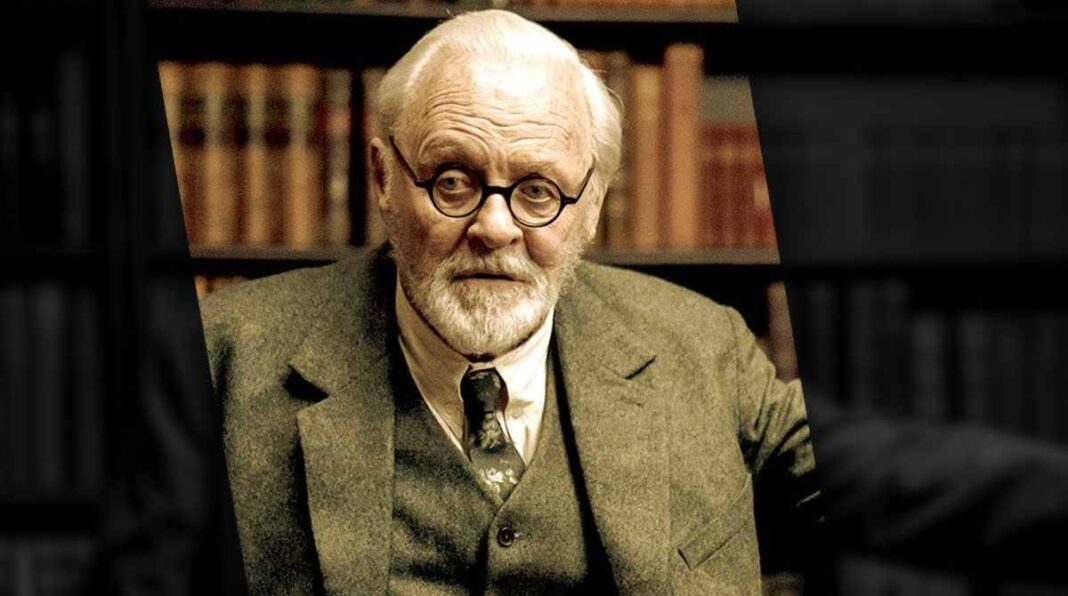Freud’s Last Session offers a philosophical discourse on the opposing opinions of Sigmund Freud and C.S. Lewis regarding creationism. While the movie delves into various fascinating topics, some of which were considered taboo in 1939, including Freud’s theories. This nature of the movie reminded me a lot of the intellectual clash between Jordan Peterson and Slavoj Žižek in their 2019 debate. Based on Armand Nicholi’s ‘The Question of God,’ the movie imagines a fictional meeting between Freud and Lewis shortly before Freud’s death. I believe this movie has been created for intellectuals and scholars with a penchant for philosophy. Both of the characters were fairly controversial figures by modern standards, but that’s what makes this movie even more interesting as their clashing opinions and the rationalization for these opinions are explored through the events of the movie.
Spoilers Ahead
Why Did Freud Move To London?
Sigmund Freud was an Austrian-Jewish psychoanalyst often hailed as the father of psychoanalysis. Despite the rejection of psychoanalysis by some as a credible scientific discipline, who even labeled it as pseudoscience, Freud’s work is widely acknowledged as pioneering in the development of modern psychology. Born in Freiberg, Moravia, Freud spent the majority of his 77 years in Vienna, where he grew up, received his education, and practiced his profession.
The rise of Hitler and the annexation of Austria posed a grave threat to the Jewish community, including Freud and his family. In March 1938, his daughter, Anna Freud, was arrested by the Gestapo, who believed that Sigmund’s research could be of use to the Nazi party. Initially targeted for arrest himself, Anna bravely intervened, offering to be detained instead due to her father’s health. Her testimony ultimately led to her release 12 hours later, as it proved the family was of no use to the Gestapo.
Following Anna’s release, Sigmund realized the imminent danger faced by his family due to rising antisemitism. He swiftly bribed authorities to facilitate their departure from Austria, relocating to London, where Anna had their Vienna home recreated. Despite his initial reluctance to leave Vienna, fearing for his family’s safety compelled Freud to reassess the situation. Sigmund had remained in Vienna during the First World War, even harboring patriotic sentiments. However, the threat of persecution during the Second World War, despite his voluntary rejection of his faith, forced him to confront the harsh reality of his identity as a Jew and the necessity of leaving the country for his family’s safety.
What Is C.S. Lewis’s Story?
C.S. Lewis, also known by his nickname Jack, was a Northern Irish writer renowned for his literary works such as ‘The Lion, The Witch and The Wardrobe.’ However, he was equally recognized for his role as a staunch Christian apologist. Born in Belfast, Jack experienced loss at a young age when his mother passed away. Struggling to cope with his grief, his father sent him to England to study at a boarding school. This sense of separation from his family served as a rather significant trauma in his life.
At the tender age of 15, Jack embraced atheism, but his worldview underwent a transformation in his later years. At 19, he was deployed to France to serve in the First World War, where he suffered severe injuries that led to his discharge from the frontline. It was during this period that he experienced the horrors of war, which undoubtedly influenced his views of the world. The day of Jack’s meeting with Freud also coincides with the German invasion of Poland, plunging London into its first bomb scare. As the threat of bombardment loomed, Freud and Jack sought refuge in a bomb shelter. However, the heightened fear triggered a panic attack in Jack, revealing the enduring trauma of his wartime experiences.
How Did Jack Become A Christian?
Jack had always had a shattered belief in God and was often influenced by his peers. Following his return from the battlefield in the First World War, he pursued his education at Oxford University and subsequently started his career as a professor of philosophy. It was at this point in 1926 that he became acquainted with J.R.R. Tolkien, who would later become one of his closest friends. Tolkien, renowned as a brilliant scholar and linguist, was a devout Christian, and he engaged in numerous discussions with Jack about the existence of God. Through these conversations and his research, starting with Codex Sinaiticus, the oldest manuscript of the New Testament, as a professor of philosophy, Jack experienced a significant shift in his beliefs. By 1929, while working on his papers, he came to identify himself as a theist, and by 1931, he decided to embrace Christianity as his faith.
Jack attributed his previous atheism to the traumatic impact of his experiences during the war, as well as the loss of his mother. These trials led him to grapple with questions of suffering, loss, and the meaning of life, ultimately guiding him toward a deeper spiritual understanding and acceptance of Christianity. About his own experiences with finding solace in the Christian faith, he wrote ‘The Pilgrim’s Regress’ in 1933.
What Are Freud’s Views On Creationism?
Sigmund Freud devoted his entire life to studying the human mind and its workings, and his understanding of faith was shaped by his experiences in this field. However, his perspective was somewhat skewed, and he disregarded the possibility of any transcendent connection beyond his own comprehension. In fact, the difference of opinion regarding Freud’s views on religion and spirituality was a significant factor in the falling out between him and Carl Jung as well. Freud used the concept of “Sehnsucht,” a German word denoting an existential longing or an idealized alternate reality, to explain the human desire for a higher power. Freud suggested that belief in God functioned as a coping mechanism for individuals facing existential anxieties, particularly those related to mortality and life’s uncertainties.
In the movie, Jack is shown embracing a somewhat idiosyncratic interpretation of Christian principles, which suits his needs. He criticizes the Bible despite acknowledging its authenticity, asserting that its imperfection lies in the lack of comprehensive information about Christ’s life. Jack argues that if writers like himself, Tolkien, or H.G. Wells were responsible for writing the Bible, they would not have allowed such clumsiness in the text. Freud counters this by suggesting that Christians only find truth in Jesus’s story precisely because it is imperfectly written. While Freud entertains the possibility of Jesus being a historical figure, he draws from his clinical experience to highlight instances where individuals have claimed messianic status due to mental illness. This underscores his skepticism regarding the divine nature of religious figures and the potential psychological roots of religious beliefs.
It is revealed that Freud’s prerogatives about god and religion are driven by his own traumatic experiences. As a child, he was raised by a strict Catholic nanny who would take him to church every Sunday, despite his being from a Jewish family. During that point in his life, he was still discovering the existence of different religions in his world. Because of his nanny’s Christian influence, his father, a devout Jew, had a conflict with her, firing her, which took away an important mother figure in his life. In 1920, his daughter, Sophie, succumbed to the Spanish flu, and his grandson died of tuberculosis, making him further question the existence of a god who would kill a 5-year-old child and his mother.
What Is Anna Freud’s Relationship With Her Father Like?
Anna Freud was the youngest daughter of Sigmund Freud, and like her father, she was a renowned psychoanalyst known for her work in child psychoanalysis. The play Freud’s Last Session, based on real events, depicts her complex relationship with her father, who exhibited narcissistic tendencies. Sigmund exerted significant control over Anna’s life from a young age, and the play portrays her struggle to balance her obligations to her aging father, who insists on being cared for solely by her. This situation forces Anna to take frequent leaves from her university position, much to the chagrin of her senior professor, who accuses her of displaying compulsive attachment disorder by idolizing her parents beyond adolescence. Although Anna exhibits traits of codependency with her father, she justifies her actions by citing his ailing health due to cancer as a reason for her care.
Another source of tension between Sigmund and Anna was her queerness, which Sigmund viewed through a sexist lens. He believed that women’s queerness was more psychologically unstable because they did not experience castration anxiety to hold them back from immoral behavior, a concept he associated solely with men. Sigmund attributed a father’s influence as the source of their daughters’ lesbianism, leading him to impose strict measures on Anna to discourage her relationship with her partner, Dorothy Burlingham. Despite Jack’s conservative Christian beliefs regarding homosexuality, he points out the inconsistencies in Sigmund Freud’s theories on the subject, which Sigmund dismisses as human error.
What Was Jack’s Relationship With Mrs. Moore Like?
During his time in the trenches of the Somme in 1917, Jack made a pact with his friend Paddy to care for each other’s parents in case one of them died during the war. Paddy offered to look after Jack’s father, and in return, Jack would take care of Paddy’s mother if the need arose. Tragically, during the Somme offensive, Paddy lost his life, while Jack suffered severe injuries. A few days later, Jack found himself being tended to by Mrs. Moore, Paddy’s mother. He recounted to her the pact he had made with Paddy, but Mrs. Moore, a progressive woman in her early 40s, graciously declined any need for guardianship, asserting her independence. However, Jack insisted on framing their connection as a friendship rather than a guardianship, hinting at a more intimate relationship.
This moment in the film is based on speculation about the bond between Jack and Mrs. Moore. They shared a maternal connection, with Mrs. Moore filling the void left by Jack’s own mother, who had passed away when he was young. Mrs. Moore’s atheism may have also influenced Jack’s early days of atheism.
In the movie, when Jack recounts this incident to Freud, the latter suspects that there might be an underlying attraction between them, a notion subtly hinted at throughout the film. Freud suggests that men who lose their mothers at a young age often gravitate towards older women. However, the discussion leaves Jack feeling anxious, indicating his discomfort with confronting his feelings.
Why Did Freud Give Jack His Own Book?
After a rather smug debate between the two intellectuals, Jack decides to take leave. He confides in Freud that his idea of God keeps evolving, often shattering as he questions his own beliefs. This trait is also evident in Freud, who frequently debunked his own theories to adopt new ideas. Before parting ways, Freud discreetly offers Jack a book, preferring not to show it to him directly, and places it inside Jack’s pocket, instructing him not to open it until Christmas. As Jack boards the train back to Oxford, he retrieves the book from his pocket, only to discover that it’s his own book, ‘The Pilgrim’s Regression.’ Amused, he flips to the first page to find a quote by Freud about trial and error in the pursuit of truth. This gesture of giving Lewis his own book symbolizes the nature of their debate in good faith and highlights the importance of conversation. It emphasizes that debates like theirs need not have winners or losers, as everyone is on a journey of trial and error until they uncover the actual truth.


